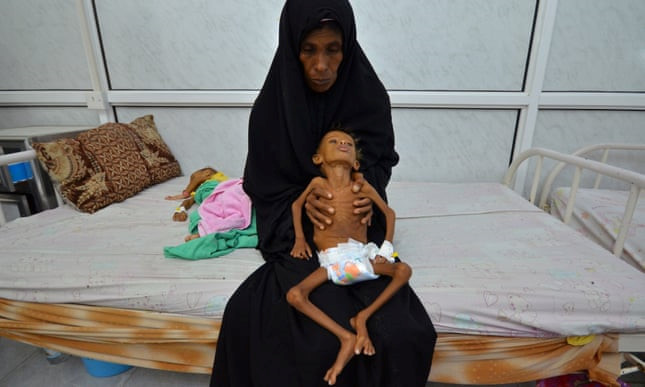Yemen facing 'worst famine in human history'
The United Nations has warned that the Yemen crisis is at risk of experiencing one of the worst famines in human history.
Recently, the UN Under-Secretary-General for Humanitarian Affairs Mark Lowcock warned that the prospect of famine in Yemen could be the "worst disaster any expert in this field has ever witnessed".
Mr Lowcock said the lives of many people in the Middle Eastern country were "clearly threatened" by famine and about 14 million people, or half the population, could soon be completely dependent on aid to survive.
Mr Lowcock said fierce fighting in the port city of Hodeida, which has been the entry point for much of the food, was threatening aid deliveries. He called for a ceasefire around ports and for ships carrying aid to pass safely through the country.
However, within hours of Mr Lowcock’s announcement, the Saudi-led coalition sent reinforcements, including tanks and armored vehicles, near the port. Yemeni officials said they were facing a new wave of attacks.
|
| A Yemeni mother and her 6-year-old son in a hospital in the port city of Hodeida. Photo: Reuters. |
The war has hampered the flow of goods into Yemen. Even as the UN ramps up aid for some 8 million people, workers are unable to reach everyone suffering from hunger.
In a report by the NGO Save the Children, food prices have doubled in Yemen. Tamer Kirolos, Save the Children's country director in Yemen, said: "The collapsing economy is a silent killer here. Many people are struggling to survive. Parents tell our staff they have gone without food for up to two days to give what little food they have to their children."
Yemen's civil war has lasted three years since Iran-backed Houthi rebels seized large parts of the Middle Eastern country, including the capital Sana'a. Saudi Arabia, the United Arab Emirates (UAE) and several other allied countries have been involved in the war since 2015 to support the Yemeni government.
Thousands of Yemeni civilians have been subjected to airstrikes and bombings, famine and the risk of infectious diseases. The Middle Eastern country has suffered the worst cholera epidemic in its history.
At least 10,000 innocent people have died and millions more are in urgent need of humanitarian aid.




.jpg)

.jpeg)


